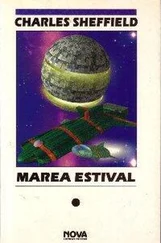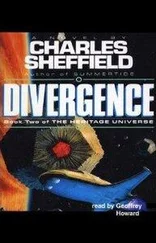“Is there anything you would particularly like to see?”
Captain Kennecott’s question was a natural one, but Saul couldn’t answer it. He had come here on inexplicable impulse. Impulse would have to guide him still.
“I would like to see the weapons storage.”
“We had anticipated that.” Kennecott turned and nodded to a woman in civilian dress, who left at once. Saul noticed the captain’s left hand, its skin smoother and whiter than the right. It was a grown prosthesis, a combination of Voorhees-McCall nerve cell regeneration with tissue engineering. The technique was still experimental, no more than five years old. But Kennecott was well over seventy. In which war had he lost it?
The captain had seen his look, and flexed his hand. “Good as new, sir. Feels like a natural arm. I suppose in a way it is. My own DNA, even if I didn’t grow it myself. No chips in it — thank God.”
Saul changed his mind about the captain. Last night he had noticed the big Adam’s apple, tired eyes, and deep-lined cheeks. Kennecott had seemed old and frail, a man out to pasture. Today he was someone who noticed everything, alert and in command, a man who had adapted rapidly to deal with the unexpected factor of a presidential arrival.
Saul tried a guess based on age and casualty rates. “Vietnam?”
Kennecott laughed. “No, sir. I was there, all right, Navy aviator, but I came through without a scratch. Then I was fool enough to do this to myself on a peacetime run. Flying an F-24 modification in ’05.”
“You weren’t invalided out?”
“They tried. I pulled every string in the Disabilities Act.”
They had been walking as they talked, down the slight slope that led away from the Officers’ Mess and the river beyond. The group of well-groomed children had disappeared. The military escort remained a careful ten paces to the rear. The air was so warm and the sun so bright that Saul imagined he could see the snow on either side of the path melting away before his eyes.
Kennecott made a right before they reached the building labeled prominently as Bachelor Enlisted Quarters, and led them on through an open gate. Saul read the sign on the high wire fence: authorized personnel only beyond this point, no foreign. The flower beds and neat shrubs emerging from the snow on either side of the gate seemed incongruously at odds with the brusque sign. The brick building beyond was square, huge, and windowless.
The civilian to whom Kennecott had signaled earlier was waiting at the open double doors. Saul had his first chance for a good look at her. Thin, late forties, maybe five-three, she stood between white-painted shell cases taller than she was. Blond, straight hair. Probably in first-rate physical condition except for the fair skin whose rugged look suggested too much direct sunlight. Why didn’t she replace it with a cultivated mask of her own face, cheap and easy to grow?
“Mr. President,” Kennecott said. “This is Dr. Madeleine Liebchen. She is the person best qualified to answer any technical questions you may have.”
Liebchen. Little love. Saul did the translation instinctively as he shook her hand. I think not. Eyes of a wonderful sapphire blue gazed coldly into his.
That look of unconcealed contempt gave Saul another reason why Captain Kennecott was likely to accompany them everywhere. I am President of all the people — if they will allow it. Many people disliked politicians. A rather smaller number hated them. A few went past that, and tried to kill them. Saul possessed various built-in protections, painfully installed after nomination night. His blood seethed with morphing antibodies, supposedly able to handle any natural or manufactured virus or bacterium (including the interlocking plasmid composite that got President Johannsen, in ’18; it was the top-secret pictures of Johannsen’s corpse, bloated so that the nose was no more than a dimple in the swollen head and the testicles were the size of grapefruit, that had persuaded Saul to take the treatment).
The implant in the roof of his mouth offered different protection. It would supposedly detect a million different poisons alone or in lethal combination, and trigger an involuntary regurgitation reflex. Except that the damned thing surely wouldn’t work at all now, since all the chips had gone belly-up.
Saul took a second look at the scowling Dr. Liebchen. No virus, and perhaps no poisons, but that still left bullets, bombs, teeth, wild animals, knives, nooses, and nuclear weapons.
Dr. Liebchen was probably just a woman who regarded politics and politicians as beneath her. That did not make her dangerous. Kennecott must know her well. He did not judge her a threat. But how well had Johannsen’s sister known Eileen Wilmore Bretherton, when she brought her to that fatal dinner?
Unlike one of his less illustrious predecessors, Saul could chew gum and walk (oral history suggested a more basic body function) at the same time. He could in fact do much more. While his internal thoughts reviewed the fate and frailties of past Presidents, he offered polite conversation to Kennecott and Liebchen. And at the same time he examined a variety of proximity fuses, artillery and artillery shells, rockets and rocket launchers, mines, torpedoes, and depth charges, all massed in tight phalanxes along the building’s concrete floor.
After ten minutes he halted. The entourage came to a stop with him. “Captain. Dr. Liebchen. When I asked to see the weapons stored here, I meant active, usable weapons. This seems more like a museum.” He gestured around him. “I know the Indian Head facility contained modern weapons, but everything here is very old. Those torpedoes . . .”
Dr. Liebchen said in a brittle voice, “Every one of the weapons you are looking at is in perfect working order. If you would care for a demonstration—”
“Allow me, Madeleine. I know you never take credit.” Captain Kennecott stepped in front of her. “Mr. President, when this base was hit by the gamma pulse we lost all external communications. For the first seventy-two hours I did not know if we were dealing with a natural phenomenon or the first stage of an external attack. It seemed safer to assume the latter. Dr. Liebchen’s discovery that many of our weapons were useless seemed to reinforce the notion of a coming assault by external agencies. Without direct orders, Dr. Liebchen embarked at once on an all-out night-and-day effort to divide the weapons stored here into two classes: working and nonworking. At first it seemed that the division was chronological. Old weapons worked, newer ones did not. As the effort proceeded, Dr. Liebchen determined that the problem was in fact electronic in nature. A wide class of electronic devices no longer functioned at all. New weapons are more dependent on such devices. The age correlation was an effect, not a cause.” Kennecott swept his arm around to cover the whole building. “Everything here may look old — and be old — but it works. If Indian Head were called upon for combat support, today, thanks to Dr. Liebchen’s tireless efforts we would be able to provide it.”
“My congratulations to everyone here.” Saul turned back to Madeleine Liebchen. “Particularly to you, Doctor. And the other weapons, the new ones that don’t work?”
“They are separately warehoused, pending a decision as to their disposal.” The bright blue eyes were no longer cold. They were sparkling. Saul was not naive enough to take credit. It wasn’t his praise, or anything else he had done. It was pure passion for her work. Madeleine Liebchen had done a superior job, and took pleasure in that.
She went on, “The nature of the malfunctions soon made it clear that the problem lay in the microchips. They cannot be repaired. They must be replaced. I could do that work, in many cases — if there were a source of replacements. But recent contact with other defense facilities suggests no such possibility in the immediate future.”
Читать дальше












